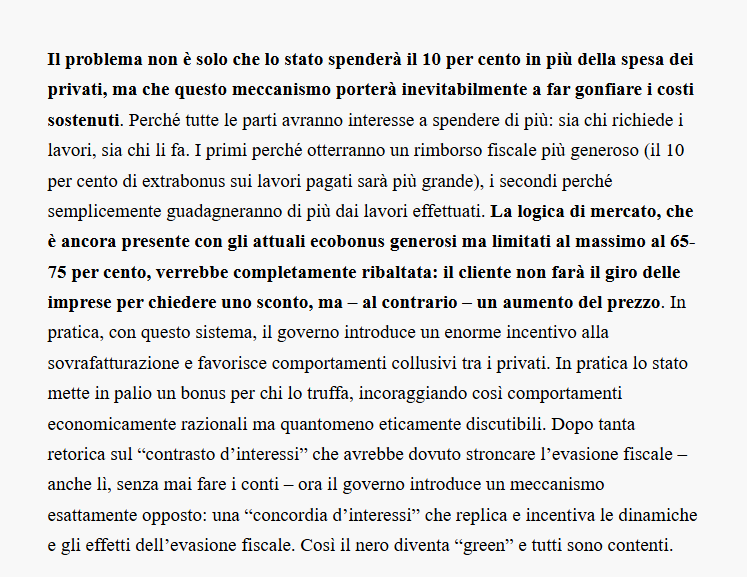1/@EpochAIResearch doubles down on preiction AI will drive 20%+ annual GDP growth. Economists remain skeptical.
This is the defining debate of today: AI builders see infinite prosperity ahead. Economists see the same limits that constrained every technological revolution.🧵 1/13
This is the defining debate of today: AI builders see infinite prosperity ahead. Economists see the same limits that constrained every technological revolution.🧵 1/13

2/The economists' core insight, which Epoch misses, is that progress works itself out of a job.
The more successful a technology becomes, the less it matters economically. Revolutionary technologies shrink their own importance precisely through their success. Larry Summers:
The more successful a technology becomes, the less it matters economically. Revolutionary technologies shrink their own importance precisely through their success. Larry Summers:

3/Consider history's greatest productivity miracle: artificial light.
In 1800, one hour of reading light cost more than a day's wages. By the 1990s, we produced the same light using 1/3,000th the energy. The price fell 40,000x.
In 1800, one hour of reading light cost more than a day's wages. By the 1990s, we produced the same light using 1/3,000th the energy. The price fell 40,000x.

4/Modern homes flood with light that would seem miraculous to anyone from 1800. We leave lights burning carelessly, illuminate entire cities all night.
Yet lighting is now a trivial fraction of the economy. Total victory made it economically irrelevant.
Yet lighting is now a trivial fraction of the economy. Total victory made it economically irrelevant.
5/Why? A sector's GDP = price × quantity.
When productivity crushes prices, quantity must rise proportionally to maintain economic weight. But we don't use 40,000x more light than in 1800. Maybe 100x. Human demand has limits.
When productivity crushes prices, quantity must rise proportionally to maintain economic weight. But we don't use 40,000x more light than in 1800. Maybe 100x. Human demand has limits.
6/Agriculture tells the same story. In 1900: 38% of workers, 15% of GDP. Today: 1% of workers, under 1% of GDP.
We produce far more food with 98% fewer workers. But we don't eat proportionally more just because food is cheap.
We produce far more food with 98% fewer workers. But we don't eat proportionally more just because food is cheap.
7/This reveals AI's first constraint: demand inelasticity.
When AI makes something essentially free, we don't suddenly want infinite amounts. There's only so much text to generate, images to create, routine tasks worth automating.
When AI makes something essentially free, we don't suddenly want infinite amounts. There's only so much text to generate, images to create, routine tasks worth automating.
8/Second constraint: Baumol's Cost Disease.
As AI makes some tasks hyperproductive, wages rise everywhere. But nursing, teaching, therapy, plumbing can't be automated. These sectors must match rising wages without productivity gains. They grow expensive and dominate the economy.
As AI makes some tasks hyperproductive, wages rise everywhere. But nursing, teaching, therapy, plumbing can't be automated. These sectors must match rising wages without productivity gains. They grow expensive and dominate the economy.
9/Third: O-Ring (named after Challenger).
Modern services depend on weakest human link. A restaurant with AI-optimized everything fails if the waiter is terrible. An AI-designed building collapses if contractors mess up. Humans remain the bottleneck.
siliconcontinent.com/p/can-ai-solve…
Modern services depend on weakest human link. A restaurant with AI-optimized everything fails if the waiter is terrible. An AI-designed building collapses if contractors mess up. Humans remain the bottleneck.
siliconcontinent.com/p/can-ai-solve…
10/This explains why technologists and economists can't agree.
Epoch sees engineering problems to solve with better AI. Economists see structural forces. You can't engineer away the limits of human demand or the need for human judgment in critical roles.
epochai.substack.com/p/ai-and-explo…
Epoch sees engineering problems to solve with better AI. Economists see structural forces. You can't engineer away the limits of human demand or the need for human judgment in critical roles.
epochai.substack.com/p/ai-and-explo…
11/The question isn't "Can AI substitute for humans?" It's "What happens when it does?"
History's answer: Automated tasks become economically trivial while the economy reorganizes around what remains human. Growth is constrained by what's hard to improve, not what we do well.
History's answer: Automated tasks become economically trivial while the economy reorganizes around what remains human. Growth is constrained by what's hard to improve, not what we do well.
12/Like electric light, AI will generate massive consumer surplus - the gap between what we'd pay and what we actually pay.
But consumer surplus doesn't show up in GDP. The lighting revolution transformed civilization yet its economic footprint nearly vanished.
But consumer surplus doesn't show up in GDP. The lighting revolution transformed civilization yet its economic footprint nearly vanished.
13/This isn't pessimism.
Steam, electricity, computers delivered enormous benefits while their economic importance shrank through success. AI will transform society profoundly. But 20% GDP growth? History says no.
My post. siliconcontinent.com/p/can-ai-solve…
Steam, electricity, computers delivered enormous benefits while their economic importance shrank through success. AI will transform society profoundly. But 20% GDP growth? History says no.
My post. siliconcontinent.com/p/can-ai-solve…
• • •
Missing some Tweet in this thread? You can try to
force a refresh













